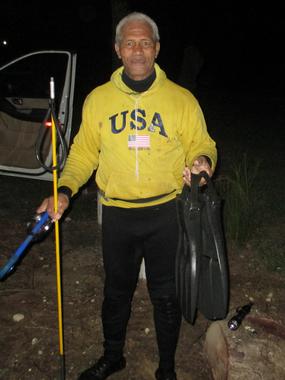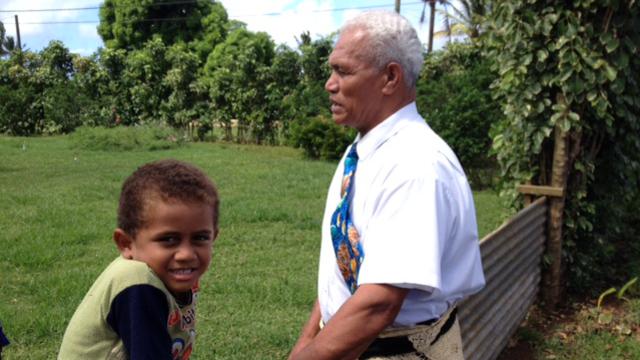Loueni Huni is not the only Tongan who fishes at night beyond the reef. When he was just a child, his father taught him how, and there are others who were taught by their fathers.
But Huni is different. While others sell their night-time catch to make a living, he gives his catch to the poor.

“There isn’t much tourism or industry here in Tonga,” explains Huni’s friend Richard Radmacher, who is from California. “So it’s hard for people to find work. Probably 10-15 percent of people are so poor that it breaks your heart.”
He mentions homes handmade out of scrap material and without furniture. “They cook outside, and the doors to their houses are thin cloth. But they are a very happy and spiritual people.”
Radmacher, who along with his wife Linda are retired and now in Tonga as a senior missionary couple for The Church of Jesus Christ of Latter-day Saints, first met Huni when both were helping to drive young missionaries, mostly ages 18 – 23, around the island.
Two retired native Tongan missionary couples, Saiosi and Katalina Va’enuku and Huni and his wife Nunia, did most of the driving. Radmacher filled in when needed.

“I’ve really gotten to know these wonderful couples,” Radmacher once wrote home to his family. “They are so tender-hearted. The wives bake bread and cook all the various Tongan foods – roots, sweet potatoes, and so forth – and take meals to the very poor. The Church itself helps hundreds of people, but there are still so many that fall through the net.”
Radmacher recalls the first time he heard Huni was catching fish to deliver to the poor. He imagined being part of it.
“I pictured the palangi (white person) way of fishing. I thought, ‘Great! We can sit on the wharf, talk about the gospel, and pull in fish for the poor. What a great way to spend part of my time as a missionary!’ Well, that’s not the way this Tongan fishes! He was busy serving as a missionary during the day, so he fished at night. He told me, ‘I use my spear to fish during the night, when the fish are sleeping.’
According to Radmacher, Huni’s wife Nunia takes her husband to a specific spot along the ocean where he puts on his flippers, mask and snorkel, then grasping his spear and his underwater flashlight, heads out into the darkness. He goes into the ocean pulling a long rope and then he swims 5 to 10 miles out into the deep part of the ocean, beyond the safety of the reef.
He starts swimming parallel to the coastline, and when he has 40-50 speared fish on his line, he turns toward shore and swims back to a designated spot several miles down from where he entered the water.
His wife parks and waits and watches. Around four or five o’clock am, Huni flashes a signal. “When she sees his light several miles out, she knows he is safe and flashes on her flashlight to guide him in,” relates Elder Radmacher. “This has happened 3-4 times a week throughout their married life.”
David Maughan, another senior missionary who knows Huni, adds, “He swims out across coral and through and over the reef in the dark. After swimming on several Tongan beaches, one gains respect for the very sharp coral material even inside the reef. It is so uneven. You sometimes have to go around columns of it.
“But going through the reef is another thing—the waves are powerful and can throw you onto the coral. So as I understand, swimmers and boats use certain paths to go through the coral so they are safe. Not many swimmers ever go beyond the reef. And remember, for Huni this is all done in the dark. Plus he’s 64 years old!”
| Temple Square is always beautiful in the springtime. Gardeners work to prepare the ground for General Conference. © 2012 Intellectual Reserve, Inc. All rights reserved. | 1 / 2 |
Once Radmacher asked Huni about sharks. He responded, “Oh, God protects me. The sharks come right up next to me, but they are my friends.” When asked whether the sharks want to eat the fish that he is pulling, he explains simply, “I pull the fish in close to my body so that the sharks won’t eat them.”
After each spearfishing expedition, Huni distributes 90% of his catch to the poor. It doesn’t matter what faith the needy people are – some are members of The Church of Jesus Christ of Latter-day Saints, others are Catholic, or Methodist or Wesleyan, or they belong to no church at all. If someone needs help, he does what he can for them.
Radmacher recalls, “I was so taken by his actions, I took him to the ocean one night when his wife went to visit family. Even though I’d been with him delivering the fish, I hadn’t actually seen him swim out to sea at night.
“It was a very scary feeling for me to watch him disappear into the black ocean. I drove to the pick-up spot and waited – one of the scariest five hours of my life. And I was safe in my car!
“I was afraid I would be in the wrong place to pick him up, that this would be the one time the sharks would get him, that something would happen and I’d never see him again.
“I can honestly say I prayed most fervently. I pleaded with Heavenly Father to bring him back safely. All I could think of was: ‘He’s too old to be doing this.’ ‘His wife isn’t even here.’ ‘Why would anyone really put themselves in danger like this for others?’ ‘Am I in the right spot to guide him back in safely?’
“It was a physical thing for him, but a mental challenge for me. At about 2:00 a.m. – when I saw him flash his light from a couple of miles out – the relief was almost overwhelming! And, of course, the next day we were out delivering the fish to the needy.”

Radmacher once emailed to his children: “In all my life, I’ve never really met someone like Huni. He’s very serious. He smiles, but doesn’t laugh much. I’ve worked with him for months now. He’s always worrying about me. He’s always saying, ‘I’m sorry to take you to the poor and see you cry. I’m sorry that your eyes are seeing all this.’”
Meanwhile Huni, who has finished his time as a missionary, still fishes beyond the reef and distributes his catch to the poor. He treats his own actions as a simple matter of fact, saying, “This is my life. This is what I do. I serve God, and He will take care of me.”
When Radmacher recently wrote his family about Huni, he concluded: “I just ask you to go do good. If you see somebody in need, help them. Poor families are all around us, and we don’t even see them because our lives are so busy. I’ve spent so much time thinking of myself, what I need, my family needs. But there is joy in helping others and a peace that comes to you when you lose yourself and serve Jesus Christ.”
Written by Cheri Loveless